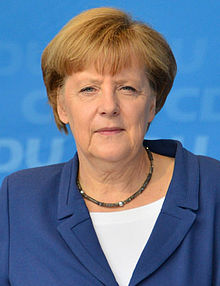Angela Merkel
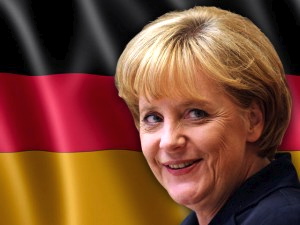
The making of Angela Merkel(unusual politician) a German enigma with Andrew Marr BBC documentary
This weekend, there’s an election that will influence the future of much of Europe – Britain, France, Spain, Italy, Greece and many other countries. But none of them can vote. The election is in Germany – and the woman at the centre of this political event is Angela Merkel. For every country in Europe, it’s all about the economy. Across the continent, people are still battling with the twists and turns of the financial crisis. And wherever you are, economic recovery depends heavily on how Angela Merkel treats the next stage of the crisis: these days, most roads lead to Berlin. That’s why it has long seemed to me that one of the most important political reporting jobs right now is to try to understand Angela Merkel better. But Mrs Merkel is an unusually private and reticent politician – there is no exhibitionism and grandstanding. Even for Germans, she’s a hard woman to know. She didn’t want to do an interview ahead of the German elections, and certainly not in English – even though she speaks it quite well. But we’ve spoken to a range of her friends, her political allies and her critics. We’ve delved back into to her upbringing in the pretty East German town of Templin, some 50 miles from Berlin, and spoken to childhood friends and student mates who knew her at a time when politics was more dangerous and tricky.
Angela Dorothea Merkel (German: [aŋˈɡeːla doʁoˈteːa ˈmɛʁkl̩] ( listen); née Kasner; born 17 July 1954) is a German politician and a former research scientist, who has been the Chancellor of Germany since 2005 and the leader of the Christian Democratic Union (CDU) since 2000. She is the first woman to hold either office, the first German Chancellor to be born after World War II, and the first post-reunification Chancellor to be raised in the former East Germany (though she was actually born in the former West Germany).
Having earned a doctorate as a physical chemist, Merkel entered politics in the wake of the Revolutions of 1989, briefly serving as the deputy spokesperson for the first democratically elected East German Government in 1990. Following the German reunification in 1990, she was elected to the Bundestag for Stralsund-Nordvorpommern-Rügen in the state of Mecklenburg-Vorpommern, a seat she has held ever since. She was later appointed as the Federal Minister for Women and Youth in 1991 under Chancellor Helmut Kohl, and became the Federal Minister for the Environment, Nature Conservation, and Nuclear Safety in 1994, serving until 1998. After the CDU/CSU coalition was defeated in 1998, she was elected Secretary-General of the CDU, before being elected the party’s first ever woman as leader in 2000.
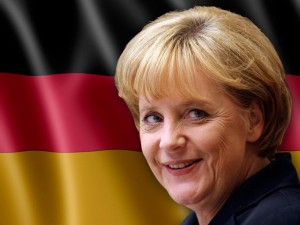 Following the 2005 federal election, she was appointed Germany’s first female Chancellor at the head of a grand coalition consisting of her own CDU party, its Bavarian sister party, the Christian Social Union (CSU), and the Social Democratic Party of Germany (SPD). In the 2009 federal election, the CDU obtained the largest share of the vote, and Merkel was able to form a coalition government with the support of the CSU, and the Free Democratic Party (FDP). At the 2013 federal election, Merkel led the CDU/CSU to a landslide victory with 41.5% of the vote and formed a second grand coalition with the SPD, after the FDP lost all of its representation in the Bundestag.
Following the 2005 federal election, she was appointed Germany’s first female Chancellor at the head of a grand coalition consisting of her own CDU party, its Bavarian sister party, the Christian Social Union (CSU), and the Social Democratic Party of Germany (SPD). In the 2009 federal election, the CDU obtained the largest share of the vote, and Merkel was able to form a coalition government with the support of the CSU, and the Free Democratic Party (FDP). At the 2013 federal election, Merkel led the CDU/CSU to a landslide victory with 41.5% of the vote and formed a second grand coalition with the SPD, after the FDP lost all of its representation in the Bundestag.
In 2007, Merkel was President of the European Council and chaired the G8, the second woman (after Margaret Thatcher) to do so. She played a central role in the negotiation of the Treaty of Lisbon and the Berlin Declaration. One of her priorities was also to strengthen transatlantic economic relations by signing the agreement for the Transatlantic Economic Council on 30 April 2007. Merkel is seen as playing a crucial role in managing the financial crisis at the European and international level, and has been referred to as “the decider.” In domestic policy, health care reform and problems concerning future energy development have been major issues of her tenure.
Angela Merkel has been described as the de facto leader of the European Union, and was ranked as the world’s second most powerful person by Forbes magazine in 2013, the highest ranking ever achieved by a woman, and is now ranked fifth. On 26 March 2014, she became the longest-serving incumbent head of government in the European Union. On 28 May 2014, she was named the most powerful woman in the world, also by Forbes.
Background and Early Life
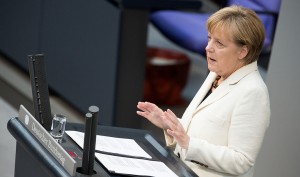 Angela Merkel in the German Bundestag, 2014
Angela Merkel in the German Bundestag, 2014
Merkel was born Angela Dorothea Kasner in Hamburg, West Germany, the daughter of Horst Kasner (1926–2011), a native of Berlin, and his wife Herlind, born in 1928 in Danzig (now Gdańsk, Poland) as Herlind Jentzsch, a teacher of English and Latin. Her mother was the daughter of the Danzig politician Willi Jentzsch and maternal granddaughter of the city clerk of Elbing (now Elbląg, Poland) Emil Drange. Herlind Jentzsch was once a member of the Social Democratic Party of Germany and briefly served as a member of the municipal council in Templin following the German reunification. Merkel has Polish ancestry through her paternal grandfather, Ludwig Kasner, a German national of Polish origin from Posen (now Poznań). The family’s original name Kaźmierczak was Germanized to Kasner in 1930.
Merkel’s father was born a Catholic, but the Kasner family converted to Lutheranism after some years, and he studied Lutheran theology in Heidelberg and, afterward, in Hamburg. In 1954 her father received a pastorate at the church in Quitzow (near Perleberg in Brandenburg), which then was in East Germany, and the family moved to Templin. Thus Merkel grew up in the countryside 80 km (50 mi) north of East Berlin.
Like most young people in the German Democratic Republic (East Germany), Merkel was a member of the Free German Youth (FDJ), the official youth movement sponsored by the ruling Socialist Unity Party. Although membership was nominally voluntary, those who didn’t join found it all but impossible to be admitted to higher education. She did not take part in the secular coming of age ceremony Jugendweihe, however, which was common in East Germany, and was confirmed instead. Later, at the Academy of Sciences, she became a member of the FDJ district board and secretary for “Agitprop” (Agitation and Propaganda). Merkel claimed that she was secretary for culture. When Merkel’s one-time FDJ district chairman contradicted her, she insisted that: “According to my memory, I was secretary for culture. But what do I know? I believe I won’t know anything when I’m 80.” Merkel’s progress in the compulsory Marxism–Leninism course was graded only genügend (sufficient, passing grade) in 1983 and 1986.
At school, she learned to speak Russian fluently, and was awarded prizes for her proficiency in Russian and Mathematics. Merkel was educated in Templin and at the University of Leipzig, where she studied physics from 1973 to 1978. While a student, she participated in the reconstruction of the ruin of the Moritzbastei, a project students initiated to create their own club and recreation facility on campus. Such an initiative was unprecedented in the GDR of that period, and initially resisted by the University of Leipzig, however, with backing of the local leadership of the SED party, the project was allowed to proceed. Merkel worked and studied at the Central Institute for Physical Chemistry of the Academy of Sciences in Berlin-Adlershof from 1978 to 1990. After being awarded a doctorate (Dr. rer. nat.) for her thesis on quantum chemistry, she worked as a researcher and published several papers.
In 1989, Merkel got involved in the growing democracy movement after the fall of the Berlin Wall, joining the new party Democratic Awakening. Following the first (and only) multi-party election of the East German state, she became the deputy spokesperson of the new pre-unification caretaker government under Lothar de Maizière. In April 1990, the Democratic Awakening merged with the East German CDU, which in turn merged with its western counterpart after reunification.
Early Political Career
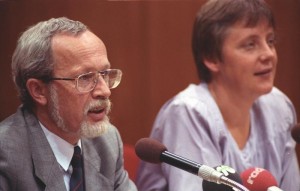 Merkel and Lothar de Maiziere in 1990
Merkel and Lothar de Maiziere in 1990
Merkel stood for election at the 1990 federal election, the first since reunification, and was elected to the Bundestag for the constituency of Stralsund – Nordvorpommern – Rügen, which is in the district of Vorpommern-Rügen. She has won re-election for this constituency at the six federal elections since. After her first election, she was almost immediately appointed to the Cabinet, serving as Minister for Women and Youth under Chancellor Helmut Kohl. In 1994, she was promoted to becoming Minister for the Environment and Nuclear Safety, which gave her greater political visibility and a platform from which to build her political career. As one of Kohl’s protégées and his youngest Cabinet Minister, she was frequently referred to by Kohl as “mein Mädchen” (“my girl”).
Leader of the Opposition
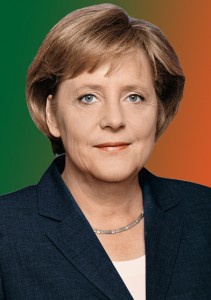 After the Kohl Government was defeated at the 1998 election, Merkel was appointed Secretary-General of the CDU, a key position as the party was no longer part of the federal government. Merkel oversaw a string of CDU election victories in six out of seven state elections in 1999, breaking the long-standing SPD-Green hold on the Bundesrat. Following a party funding scandal which compromised many leading figures of the CDU, including Kohl himself and his successor as CDU Leader, Wolfgang Schäuble, Merkel criticised her former mentor publicly and advocated a fresh start for the party without him. She was subsequently elected to replace Schäuble, becoming the first female leader of a German party on 10 April 2000. Her election surprised many observers, as her personality offered a contrast to the party she had been elected to lead; Merkel is a centrist Protestant originating from predominantly Protestant northern Germany, while the CDU is a male-dominated, socially conservative party with strongholds in western and southern Germany, and its Bavarian sister party, the CSU, has deep Catholic roots.
After the Kohl Government was defeated at the 1998 election, Merkel was appointed Secretary-General of the CDU, a key position as the party was no longer part of the federal government. Merkel oversaw a string of CDU election victories in six out of seven state elections in 1999, breaking the long-standing SPD-Green hold on the Bundesrat. Following a party funding scandal which compromised many leading figures of the CDU, including Kohl himself and his successor as CDU Leader, Wolfgang Schäuble, Merkel criticised her former mentor publicly and advocated a fresh start for the party without him. She was subsequently elected to replace Schäuble, becoming the first female leader of a German party on 10 April 2000. Her election surprised many observers, as her personality offered a contrast to the party she had been elected to lead; Merkel is a centrist Protestant originating from predominantly Protestant northern Germany, while the CDU is a male-dominated, socially conservative party with strongholds in western and southern Germany, and its Bavarian sister party, the CSU, has deep Catholic roots.
Following Merkel’s election as CDU Leader, she enjoyed considerable popularity among the German population and polls indicated that many Germans would like to see her become Chancellor Gerhard Schröder’s main challenger in the 2002 election. However she was subsequently outmaneuvered politically by CSU Leader Edmund Stoiber, to whom she eventually ceded the privilege of challenging Schröder. He went on to squander a large lead in opinion polls to lose the election by a razor-thin margin. After Stoiber’s defeat in 2002, in addition to her role as CDU Leader, Merkel became Leader of the Opposition in the Bundestag; Friedrich Merz, who had held the post prior to the 2002 election, was eased out to make way for Merkel.
Merkel supported a substantial reform agenda concerning Germany’s economic and social system and was considered to be more pro-market than her own party (the CDU); she advocated changes to German labour law, specifically removing barriers to laying off employees and increasing the allowed number of work hours in a week, arguing that existing laws made the country less competitive because companies cannot easily control labour costs at times when business is slow.
Merkel argued for Germany’s nuclear power to be phased out less quickly than the Schröder administration had planned.
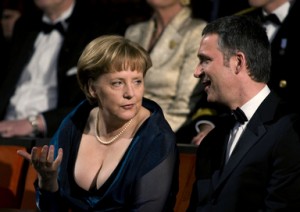 Merkel advocated a strong transatlantic partnership and German-American friendship. In the spring of 2003, defying strong public opposition, Merkel came out in favour of the U.S. invasion of Iraq, describing it as “unavoidable” and accusing Chancellor Gerhard Schröder of anti-Americanism. She criticised the government’s support for the accession of Turkey to the European Union and favoured a “privileged partnership” instead. In doing so, she reflected public opinion that grew more hostile toward Turkish membership of the European Union.
Merkel advocated a strong transatlantic partnership and German-American friendship. In the spring of 2003, defying strong public opposition, Merkel came out in favour of the U.S. invasion of Iraq, describing it as “unavoidable” and accusing Chancellor Gerhard Schröder of anti-Americanism. She criticised the government’s support for the accession of Turkey to the European Union and favoured a “privileged partnership” instead. In doing so, she reflected public opinion that grew more hostile toward Turkish membership of the European Union.
On 30 May 2005, Merkel won the CDU/CSU nomination as challenger to Chancellor Gerhard Schröder of the SPD in the 2005 national elections. Her party began the campaign with a 21 point lead over the SPD in national opinion polls, although her personal popularity lagged behind that of the incumbent. However, the CDU/CSU campaign suffered[citation needed] when Merkel, having made economic competence central to the CDU’s platform, confused gross and net income twice during a televised debate. She regained some momentum after she announced that she would appoint Paul Kirchhof, a former judge at the German Constitutional Court and leading fiscal policy expert, as Minister of Finance.
Merkel and the CDU lost ground after Kirchhof proposed the introduction of a flat tax in Germany, again undermining the party’s broad appeal on economic affairs and convincing many voters that the CDU’s platform of deregulation was designed to benefit only the rich. This was compounded by Merkel proposing to increase VAT to reduce Germany’s deficit and fill the gap in revenue from a flat tax. The SPD were able to increase their support simply by pledging not to introduce flat taxes or increase VAT. Although Merkel’s standing recovered after she distanced herself from Kirchhof’s proposals, she remained considerably less popular than Schröder, and the CDU’s lead was down to 9% on the eve of the election.
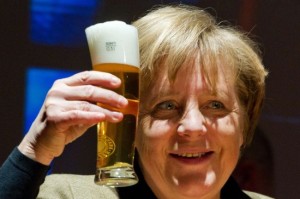 On 18 September 2005, Merkel’s CDU/CSU and Schröder’s SPD went head-to-head in the national elections, with the CDU/CSU winning 35.3% (CDU 27.8%/CSU 7.5%) of the second votes to the SPD’s 34.2%. Neither the SPD-Green coalition nor the CDU/CSU and its preferred coalition partners, the Free Democratic Party, held enough seats to form a majority in the Bundestag, and both Schröder and Merkel claimed victory. A grand coalition between the CDU/CSU and SPD faced the challenge that both parties demanded the chancellorship. However, after three weeks of negotiations, the two parties reached a deal whereby Merkel would become Chancellor and the SPD would hold 8 of the 16 seats in the cabinet. The coalition deal was approved by both parties at party conferences on 14 November 2005. Merkel was elected Chancellor by the majority of delegates (397 to 217) in the newly assembled Bundestag on 22 November 2005, but 51 members of the governing coalition voted against her.
On 18 September 2005, Merkel’s CDU/CSU and Schröder’s SPD went head-to-head in the national elections, with the CDU/CSU winning 35.3% (CDU 27.8%/CSU 7.5%) of the second votes to the SPD’s 34.2%. Neither the SPD-Green coalition nor the CDU/CSU and its preferred coalition partners, the Free Democratic Party, held enough seats to form a majority in the Bundestag, and both Schröder and Merkel claimed victory. A grand coalition between the CDU/CSU and SPD faced the challenge that both parties demanded the chancellorship. However, after three weeks of negotiations, the two parties reached a deal whereby Merkel would become Chancellor and the SPD would hold 8 of the 16 seats in the cabinet. The coalition deal was approved by both parties at party conferences on 14 November 2005. Merkel was elected Chancellor by the majority of delegates (397 to 217) in the newly assembled Bundestag on 22 November 2005, but 51 members of the governing coalition voted against her.
Reports had indicated that the grand coalition would pursue a mix of policies, some of which differ from Merkel’s political platform as leader of the opposition and candidate for Chancellor. The coalition’s intent was to cut public spending whilst increasing VAT (from 16 to 19%), social insurance contributions and the top rate of income tax.
Merkel had stated that the main aim of her government would be to reduce unemployment, and that it is this issue on which her government will be judged.
Chancellor of Germany
Wikisource has original text related to this article: Angela Merkel’s 2007 Speech to the European Parliament. On 22 November 2005, Merkel assumed the office of Chancellor of Germany following a stalemate election that resulted in a grand coalition with the SPD. She was re-elected in 2009 with a larger majority and was able to form a governing coalition with the FDP. In the election of September 2013 the CDU/CSU parties emerged as winners, but they need a coalition partner to form the Government.
Domestic Policy
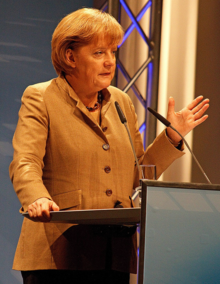 Merkel in March 2010, in Unna, Northrhine-Westphalia
Merkel in March 2010, in Unna, Northrhine-Westphalia
In October 2010, Merkel told a meeting of younger members of her conservative Christian Democratic Union (CDU) party at Potsdam that attempts to build a multicultural society in Germany had “utterly failed,” stating: “The concept that we are now living side by side and are happy about it does not work” and “we feel attached to the Christian concept of mankind, that is what defines us. Anyone who doesn’t accept that is in the wrong place here.” She continued to say that immigrants should integrate and adopt Germany’s culture and values. This has added to a growing debate within Germany on the levels of immigration, its effect on Germany and the degree to which Muslim immigrants have integrated into German society.

